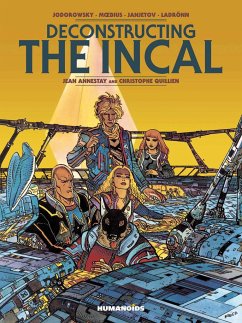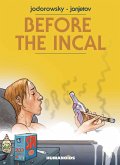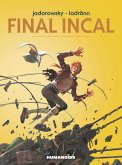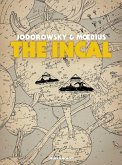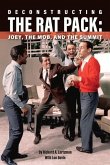Schade – dieser Artikel ist leider ausverkauft. Sobald wir wissen, ob und wann der Artikel wieder verfügbar ist, informieren wir Sie an dieser Stelle.
- Gebundenes Buch
- Merkliste
- Auf die Merkliste
- Bewerten Bewerten
- Teilen
- Produkt teilen
- Produkterinnerung
- Produkterinnerung
The second reference guide to the Jodoverse, focused on unveiling the secrets of the Universe's fiercest warrior clan: the Metabarons.
Andere Kunden interessierten sich auch für
![Before The Incal Before The Incal]() Alejandro JodorowskyBefore The Incal36,99 €
Alejandro JodorowskyBefore The Incal36,99 €![Final Incal Final Incal]() Alejandro JodorowskyFinal Incal29,99 €
Alejandro JodorowskyFinal Incal29,99 €![The Incal Black & White Edition The Incal Black & White Edition]() Alejandro JodorowskyThe Incal Black & White Edition87,99 €
Alejandro JodorowskyThe Incal Black & White Edition87,99 €![Deconstructing the Fitness-Industrial Complex Deconstructing the Fitness-Industrial Complex]() Justice WilliamsDeconstructing the Fitness-Industrial Complex23,99 €
Justice WilliamsDeconstructing the Fitness-Industrial Complex23,99 €![Deconstructing the NYSTCE Deconstructing the NYSTCE]() Bridgette GubernatisDeconstructing the NYSTCE17,99 €
Bridgette GubernatisDeconstructing the NYSTCE17,99 €![Deconstructing the Rat Pack: Joey, the Mob and the Summit Deconstructing the Rat Pack: Joey, the Mob and the Summit]() Richard A. LertzmanDeconstructing the Rat Pack: Joey, the Mob and the Summit19,99 €
Richard A. LertzmanDeconstructing the Rat Pack: Joey, the Mob and the Summit19,99 €
The second reference guide to the Jodoverse, focused on unveiling the secrets of the Universe's fiercest warrior clan: the Metabarons.
Produktdetails
- Produktdetails
- Verlag: Humanoids, Inc
- Seitenzahl: 112
- Erscheinungstermin: 24. Oktober 2017
- Englisch
- Abmessung: 320mm x 240mm x 15mm
- Gewicht: 920g
- ISBN-13: 9781594656903
- ISBN-10: 1594656908
- Artikelnr.: 47769516
- Herstellerkennzeichnung
- Libri GmbH
- Europaallee 1
- 36244 Bad Hersfeld
- gpsr@libri.de
- Verlag: Humanoids, Inc
- Seitenzahl: 112
- Erscheinungstermin: 24. Oktober 2017
- Englisch
- Abmessung: 320mm x 240mm x 15mm
- Gewicht: 920g
- ISBN-13: 9781594656903
- ISBN-10: 1594656908
- Artikelnr.: 47769516
- Herstellerkennzeichnung
- Libri GmbH
- Europaallee 1
- 36244 Bad Hersfeld
- gpsr@libri.de
When he was little, Christophe Quillien dreamed of being a superhero. Alas, he quickly realized that life had given him a single super-power: writing. Since then, he has busied himself by writing books on comics. He published Grandes aventurières et femmes fatales de la bande dessinée (Huginn & Muninn), Méchants, crapules et autres vilains de la bande dessinée (Huginn & Muninn), La Bande dessinée (Gallimard Jeunesse), Le Guide des 100 bandes dessinées incontournables (Librio), La Bande dessinée à Paris (Parigramme). Il a aussi écrit des articles sur la BD (et d’autres sujets moins sérieux) dans la presse: The Good Life, Rolling Stone, Epok, Le Magazine Littéraire, Le Monde, Les Inrockuptibles, Télérama Sortir… He has also written articles about comics (and other less serious topics) in the press: The Good Life, Rolling Stone, Epok, The Literary Magazine, The World, Inrockuptibles, Télérama Sortir ... Alejandro Jodorowsky Prullansky (Spanish: [xoðo'?ofski]; born 17 February 1929) is a Chilean and French avant-garde filmmaker. Best known for his films El Topo (1970), The Holy Mountain (1973) and Santa Sangre (1989), Jodorowsky has been "venerated by cult cinema enthusiasts" for his work which "is filled with violently surreal images and a hybrid blend of mysticism and religious provocation".[1] Born to Jewish-Ukrainian parents in Chile, Jodorowsky experienced an unhappy and alienated childhood, and so immersed himself in reading and writing poetry. Dropping out of college, he became involved in theater and in particular mime, working as a clown before founding his own theater troupe, the Teatro Mimico, in 1947. Moving to Paris in the early 1950s, Jodorowsky studied traditional mime under Étienne Decroux, and put his miming skills to use in the silent film Les têtes interverties (1957), directed with Saul Gilbert and Ruth Michelly. From 1960 onwards he divided his time between Mexico City and Paris, where he co-founded Panic Movement, a surrealist performance art collective that staged violent and shocking theatrical events. In 1966 he created his first comic strip, Anibal 5, and in 1967 he directed his first feature film, the surrealist Fando y Lis, which caused a huge scandal in Mexico, eventually being banned. His next film, the acid western El Topo (1970), became a hit on the midnight movie circuit in the United States, considered the first-ever midnight cult film, and garnered high praise from John Lennon, who convinced former Beatles manager Allen Klein to provide Jodorowsky with $1 million to finance his next film. The result was The Holy Mountain (1973), a surrealist exploration of western esotericism. Disagreements with Klein, however, led to both The Holy Mountain and El Topo failing to gain widespread distribution, although both became classics on the underground film circuit.[1] After a cancelled attempt at filming Frank Herbert's 1965 science fiction novel Dune, Jodorowsky produced five more films: the family film Tusk (1980); the surrealist horror Santa Sangre (1989); the failed blockbuster The Rainbow Thief (1990); and the first two films in a planned five-film autobiographical series The Dance of Reality (2013) and Endless Poetry (2016). Jodorowsky is also a comic book writer, most notably penning the science fiction series The Incal throughout the 1980s, which has been described as having a claim to be "the best comic book" ever written.[2] Other comic books he has written include The Technopriests and Metabarons. Jodorowsky has also extensively written and lectured about his own spiritual system, which he calls "psychomagic" and "psychoshamanism", which borrows from alchemy, the tarot, Zen Buddhism and shamanism.[3] His son Cristóbal has followed his teachings on psychoshamanism; this work is captured in the feature documentary Quantum Men, directed by Carlos Serrano Azcona.[4] Jean "Mœbius" Giraud was a French artist, cartoonist and writer who worked in the Franco-Belgian bandes dessinées tradition. Giraud garnered worldwide acclaim predominantly under the pseudonym Mœbius and to a lesser extent under the name Gir, which he used for the Blueberry series and his paintings. Mœbius' most famous work was The Incal, written by Alejandro Jodorowsky. He also contributed storyboards and concept designs to numerous science fiction and fantasy films, such as Alien, Tron, The Fifth Element and The Abyss.

